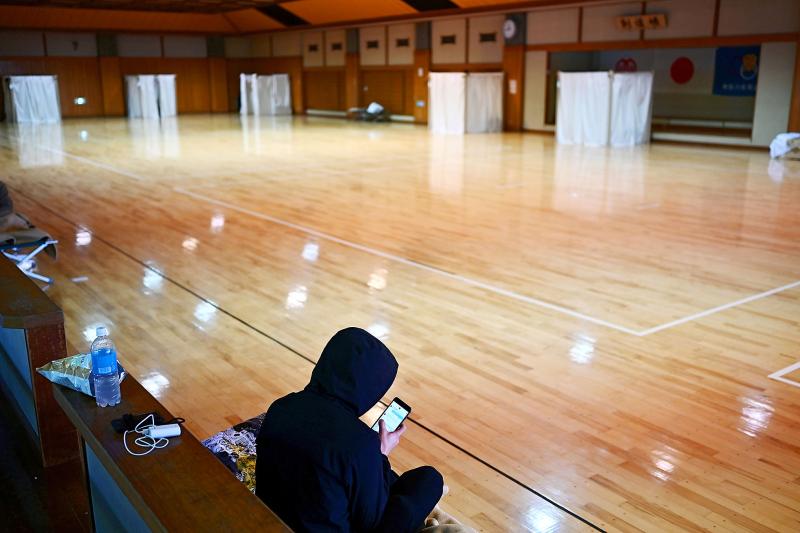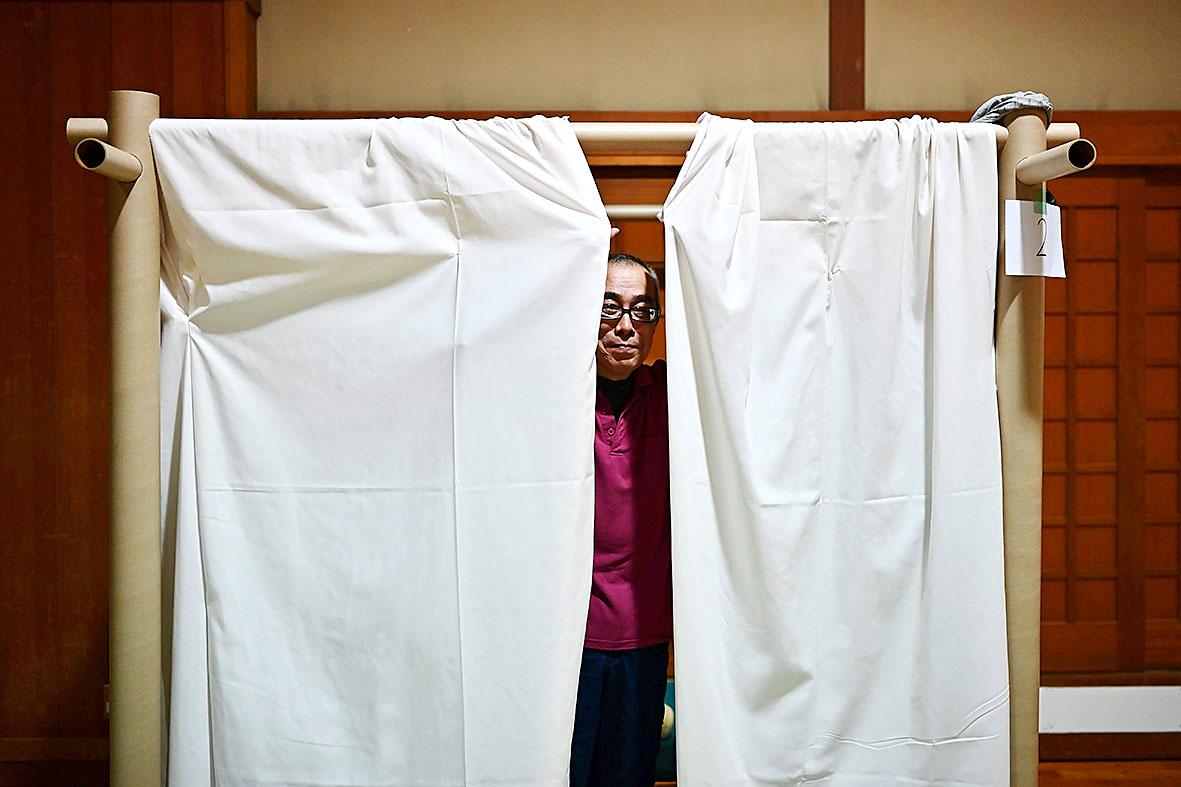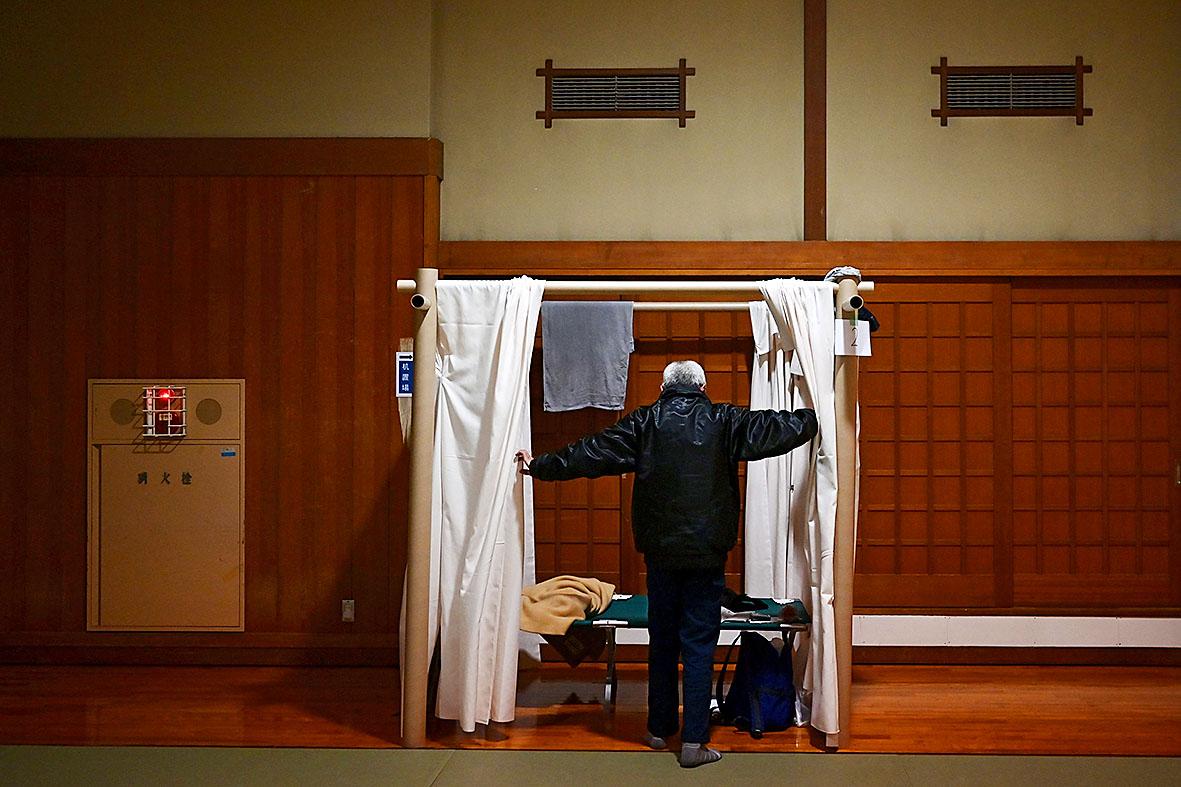Thousands of homeless “net cafe refugees” in Japan risk being turfed out onto the streets as the coronavirus pandemic forces the sudden closure of their uniquely Japanese 24/7 comic book havens.
The ubiquitous all-night internet and “manga” comic cafes offer couches, computers, comics, soft drinks and shower facilities for an overnight stay typically priced around 2,000 yen (US$18).
An estimated 4,000 people down on their luck make their home in such cafes in Tokyo alone, and activists worry that shutting them down could lead to suicides and a spike in rough sleepers.

Photo: AFP
Some local authorities are now opening shelters to accommodate “net cafe refugees” and keep them from sleeping out in the open.
One 58-year-old occasional construction-site worker said his main aim was “avoiding getting wet,” as he found a roof over his head at a shelter converted from a martial arts center in Yokohama near Tokyo.
“I thought of sleeping on a bench at a train station... or subway stairs going underground,” said the grey-haired man, who declined to give his name.

Photo: AFP
His net cafe informed him at the weekend it would be closing due to state of emergency measures in Japan to stem the spread of the coronavirus.
“I used to go to work from net cafes... now I sometimes have a job, sometimes not, due to the coronavirus,” he said, adding that it was nearly impossible to find a permanent job at his age.
Renting an apartment in Japan requires a very expensive deposit and presents tricky administrative hurdles, leaving net cafes a convenient option for many of the country’s hidden poor.

Photo: AFP
“I have nowhere to go to, few acquaintances,” said the man.
‘DISCREET AND QUIET’
The temporary shelters at the judo hall in Yokohama, operated by the local Kanagawa authorities, have been designed by a team led by award-winning Japanese architect Shigeru Ban to offer privacy and prevent infections.
Residents sleep on camp-style cots or cardboard beds partitioned off by a frame of sturdy paper tubes with cloth hanging from the top of the cubicle to the floor.
Ban is famed for other emergency shelters and buildings, including the Cardboard Cathedral for Christchurch in New Zealand after the 2011 earthquake.
The aim is to provide a safe place to those driven out by the coronavirus crisis, said Yuji Miyakoshi, an official at the municipal government.
The free shelter has hosted nearly 40 people since opening on Saturday and one resident said it had been proved invaluable after his “capsule hotel” accommodation closed two days ago.
“I went to work, slept at the hotel and went back to work. I moved to this place but nothing has changed so much,” said the man in his 30s who works in construction.
Miyakoshi said the people in the shelter were “quite discreet and quiet... My feeling is that many of them are obviously not good at asserting themselves.”
‘UNSAFE HOUSING CONDITIONS’
On the surface, Japan appears a wealthy and prosperous society and visitors to Tokyo and other major cities are often struck by the relative lack of homeless people seen in other world capitals.
The Japanese economy bounced back from a recession in the 1990s, creating millions of new jobs, but critics said many of them were temporary and created a new class of urban poverty.
The manga cafes were initially a haven for late-working — or late-drinking — business people from far-flung suburbs who missed the last train home, but eventually became a shelter for Japan’s working poor.
Coronavirus has driven these people into a corner, said Tsuyoshi Inaba, who has long been involved in helping homeless people.
Inaba estimates there are already 2,000 homeless in Tokyo — double the official figure — as public surveys conducted during the day often miss people sleeping rough at night after a day’s work.
Combined with 4,000 net cafe refugees, “some 6,000 people are in unstable, unsafe housing situations” in Tokyo alone, Inaba said.
The Tokyo Metropolitan Government, which ordered establishments such as net cafes closed amid a spike of coronavirus cases in the capital, is trying to find a solution for the hundreds abruptly made homeless.
But activists say not enough accommodation is being provided and that the conditions are too onerous — such as requiring applicants to prove they have been in Tokyo for six months or longer.
Many kicked out of net cafes have no option but to sleep on the street if they can’t find a proper shelter, Inaba said, adding: “This could cause social confusion and suicides are feared to increase.”
If official aid remains inadequate, Inaba foresees a “big problem” that could even contribute to a further spreading of coronavirus.
“Some people could move to provincial cities despite the possibility that they may have the virus,” he warned.

Towering high above Taiwan’s capital city at 508 meters, Taipei 101 dominates the skyline. The earthquake-proof skyscraper of steel and glass has captured the imagination of professional rock climber Alex Honnold for more than a decade. Tomorrow morning, he will climb it in his signature free solo style — without ropes or protective equipment. And Netflix will broadcast it — live. The event’s announcement has drawn both excitement and trepidation, as well as some concerns over the ethical implications of attempting such a high-risk endeavor on live broadcast. Many have questioned Honnold’s desire to continues his free-solo climbs now that he’s a

Lines between cop and criminal get murky in Joe Carnahan’s The Rip, a crime thriller set across one foggy Miami night, starring Matt Damon and Ben Affleck. Damon and Affleck, of course, are so closely associated with Boston — most recently they produced the 2024 heist movie The Instigators there — that a detour to South Florida puts them, a little awkwardly, in an entirely different movie landscape. This is Miami Vice territory or Elmore Leonard Land, not Southie or The Town. In The Rip, they play Miami narcotics officers who come upon a cartel stash house that Lt. Dane Dumars (Damon)

As Taiwan’s second most populous city, Taichung looms large in the electoral map. Taiwanese political commentators describe it — along with neighboring Changhua County — as Taiwan’s “swing states” (搖擺州), which is a curious direct borrowing from American election terminology. In the early post-Martial Law era, Taichung was referred to as a “desert of democracy” because while the Democratic Progressive Party (DPP) was winning elections in the north and south, Taichung remained staunchly loyal to the Chinese Nationalist Party (KMT). That changed over time, but in both Changhua and Taichung, the DPP still suffers from a “one-term curse,” with the

Today Taiwanese accept as legitimate government control of many aspects of land use. That legitimacy hides in plain sight the way the system of authoritarian land grabs that favored big firms in the developmentalist era has given way to a government land grab system that favors big developers in the modern democratic era. Articles 142 and 143 of the Republic of China (ROC) Constitution form the basis of that control. They incorporate the thinking of Sun Yat-sen (孫逸仙) in considering the problems of land in China. Article 143 states: “All land within the territory of the Republic of China shall